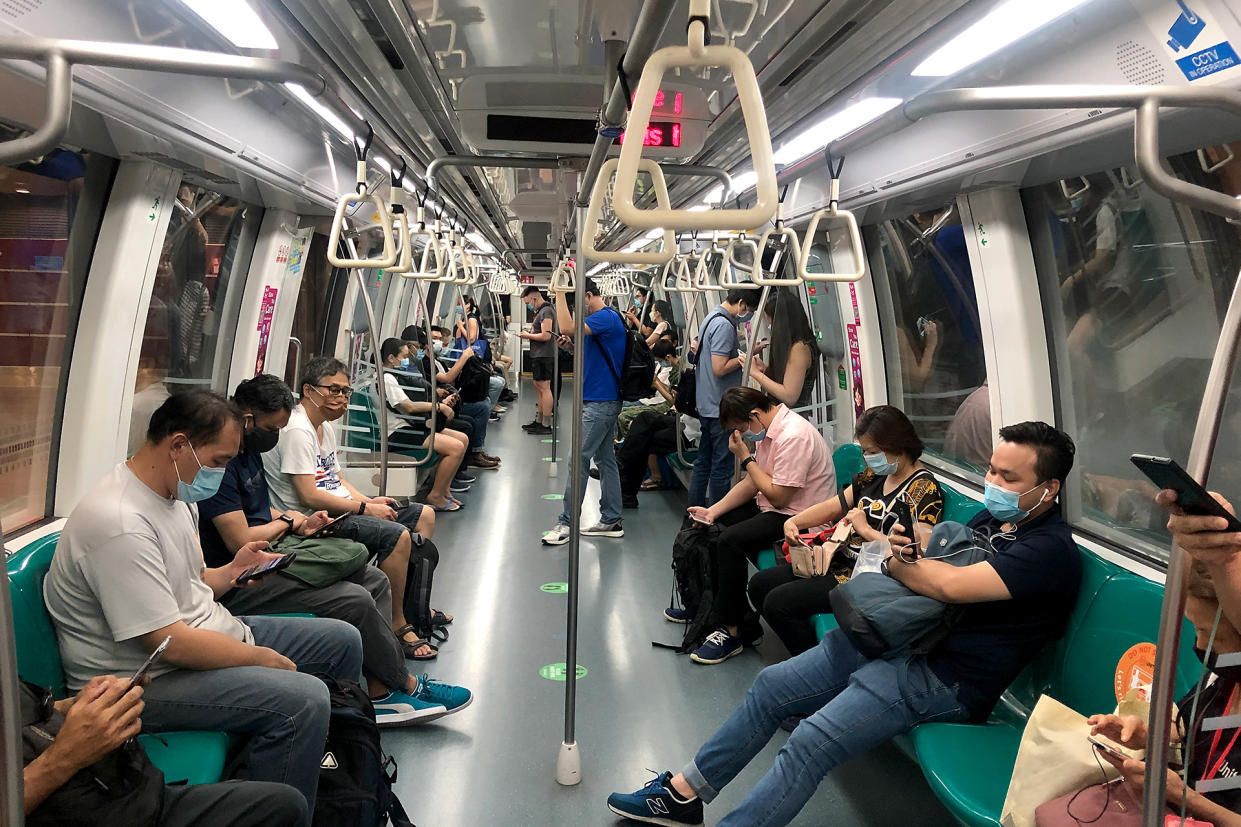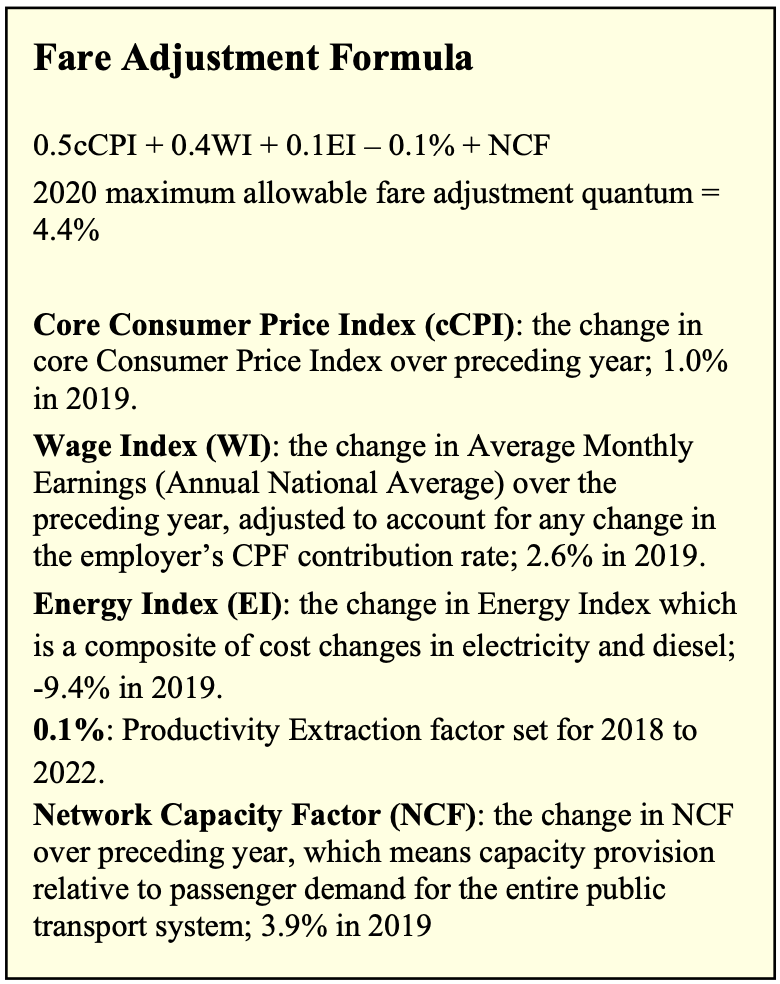No bus, train fare hikes from end-2020 until next review in 2021 due to COVID-19: Public Transport Council

SINGAPORE — In a bid to mitigate the economic impact of COVID-19 on Singaporeans, bus and train fares will remain unchanged from end-2020, with fare adjustments rolled over till the next review exercise in 2021.
The maximum allowable fare adjustment quantum for this year’s Fare Review Exercise (FRE) - amounting to 4.4 per cent - will be implemented at the next FRE in 2021, said the Public Transport Council (PTC) at a virtual media briefing on Friday (4 September). Concession fares and schemes will also remain unchanged.
SBS Transit and SMRT Trains had applied for the 4.4 per cent quantum in the second half of August. SBS Transit cited losses in its rail operations and significant cost pressures in areas such as manpower and repairs and maintenance. Operating cost has also further increased due to safety measures to deal with the pandemic. In its latest financial year, SBS Transit’s train segment reported a loss in tens of millions of dollars.
Meanwhile, SMRT cited escalating costs to operate an expanding train network with increasing operations and maintenance demands. SMRT Trains also incurred additional costs to ensure a safe transit environment for commuters, in light of the pandemic. For its latest financial year ended March 2020, SMRT Trains recorded a net loss of around $20 million after tax.
Citing the “exceptional economic circumstances” brought on by the pandemic, PTC chair Richard Magnus said the decision not to raise fares is aimed at helping to ease the financial burden on commuters. “Our priority will be to safeguard commuters’ interests, while ensuring a financially sustainable public transport system that continues to meet the needs of Singaporeans in the years to come.”
PTC said that it will continue to monitor the macroeconomic indices and prevailing economic conditions closely. In making its decision for the FRE in 2021, the Council will also continue to balance fare affordability and financial sustainability.
Were fare reductions considered?

The move is a sharp contrast to the 2019 FRE, when the PTC approved one of the largest public transport fare increases in recent years, with card fares for adults travelling on buses and trains increasing by up to nine cents.
Asked by Yahoo News Singapore if the PTC had considered fare reductions or increasing concessionary schemes, Magnus acknowledged that the former had been considered but eventually decided against, due to a number of factors.
The PTC chair noted that there is already a “wide gap” between fare revenue and operating costs, with the former insufficient in meeting the cost of the latter.
Assistance is also being extended to low-income families to mitigate transport costs, with the application deadline for the 2019 Public Transport Voucher (PTV) Exercise extended from 31 October 2020 to 31 January 2021, to give eligible households more time to apply for the vouchers. Around 30,000 low-income households will also progressively receive PTVs directly.
Magnus also cited “wider-based support” that is already being given by the government through various budget measures, such as the $600 payout given to every Singaporean in March.
Mid-term NCF review

PTC noted that the “sharp and sustained drop” in ridership due to the pandemic significantly affects the Network Capacity Factor (NCF) component in the fare adjustment formula. Alongside the NCF, the formula is based on the Core Consumer Price Index, Wage Index, Energy Index and a Productivity Extraction factor of 0.1 per cent.
The NCF, which was introduced in 2018, is not designed to address sharp fluctuations in ridership caused by exceptional circumstances, said Magnus.
PTC will therefore conduct a mid-term review on how NCF ought to be applied, or whether it should be partially or totally excluded, when considering its effect on next year’s fare adjustment. The review will be completed before the next FRE in 2021.
In addition, the rail network has been expanding steadily, alongside the rapid advance in productivity-enhancing technology. At the same time, the government is providing significant operational subsidies to sustain the public transport network.
“This mid-term review is therefore timely to ensure that fare adjustment formula remains relevant and responsive,” said PTC.
Sharp drop in ridership
PTC noted that the pandemic has significantly affected public transport operators, with whole-day ridership falling by around 75 per cent during the partial lockdown from April to June. Nevertheless, trains and buses have continued to run largely at pre-pandemic frequencies.
Ridership has been slowly creeping up since - average weekday ridership is now at 60 per cent of pre-COVID levels. Bus and train frequencies are expected to remain at current levels. Public transport operators have also stepped up cleaning regimes, which come at a significant cost amidst the sharp drop in fare revenue.
Prior to COVID-19, authorities were expected to spend close to $1 billion to renew and upgrade rail operating assets, and another $1 billion to subsidise public bus services annually over the next five years. This translates to more than $1 in subsidies for every journey taken.
“With the impact of COVID-19, revenues have fallen further, and we expect government subsidies to be even higher this year,” said the PTC.
When asked if the government would be absorbing the 4.4 per cent quantum increase, Magnus said, “Will the operators be able to run the operations at their costs? I think there's already discussion between the government and the public transport operators with regard to this particular area...the principle really is that there should be optimisation of the public transport system, bearing in mind the demand and the supply and the situation, at that point of time.”
Stay in the know on-the-go: Join Yahoo Singapore's Telegram channel at http://t.me/YahooSingapore
Related stories:
Essential business, official travel between Singapore and South Korea now allowed
Adult card fares to increase by up to 9 cents: Public Transport Council
Bus, train card fares for adults to increase by 6 cents: Public Transport Council



